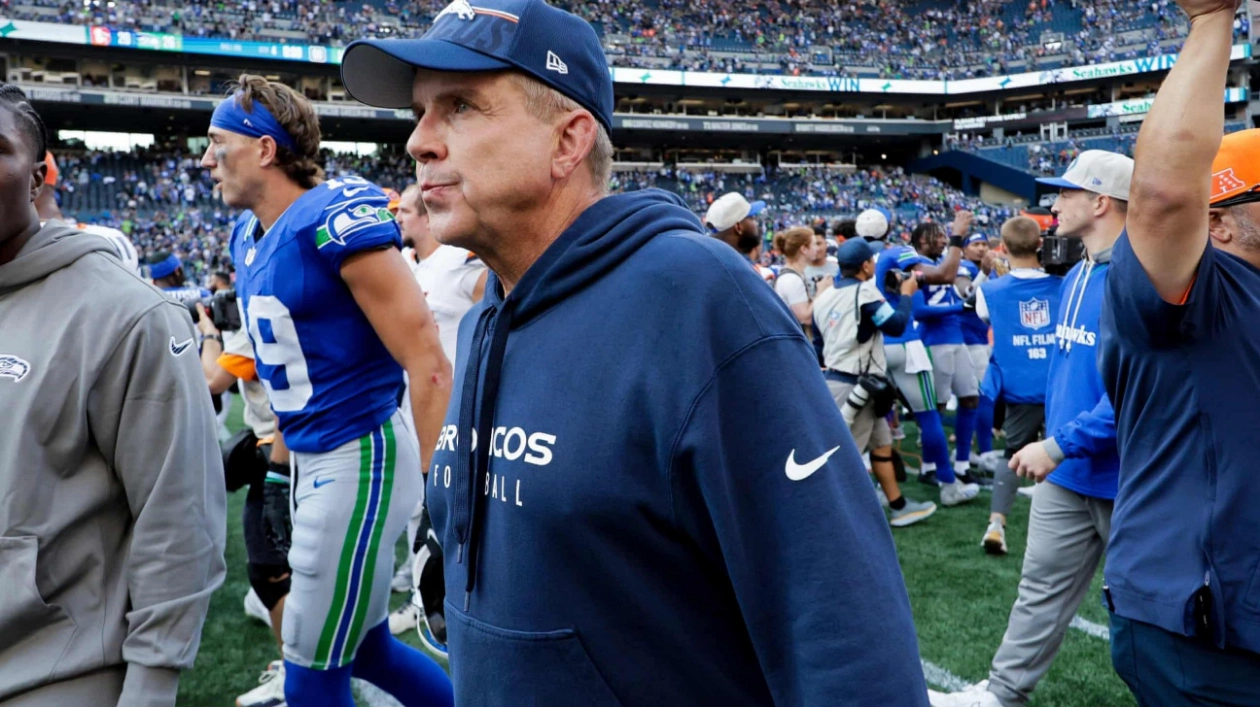It was just last season when Sean Payton arrived in Denver and ignited a firestorm, branding Nathaniel Hackett’s tenure with the Broncos as one of “the worst coaching jobs” in NFL history. It would be interesting to see where he places his first two games of this season in that same context. The Broncos have stumbled out of the gate with an 0-2 start. Extending the timeline further, Denver has managed just two wins in their last eight games, with both victories coming against a team quarterbacked by Easton Stick. Through the first two weeks of this season, the Broncos’ offense has faltered in four out of eight quarters. Payton, once a pioneer of offensive football, appears to be out of ideas—or at least out of time. His offense is mired in 2013, and is led by a rookie quarterback, Bo Nix, who seems overwhelmed. The advanced metrics this season rank Denver’s offense ahead of only the struggling Carolina Panthers, a team that recently benched their quarterback, in part due to concerns that he struggles to see over the line of scrimmage.
Payton seems as perplexed as anyone by Denver’s ineptitude. “We have to start really looking at who we are asking to do what,” he said on Sunday. “What scheme fits our players? What scheme fits our quarterback?” One would expect a coach to have these answers before thrusting an unprepared rookie into the fire against two of the league’s best defenses. Initially, hiring Payton made sense. He was a decorated coach who would bring immediate credibility to an organization that had become a laughing stock. The Broncos had a new ownership group, and they were willing to pay $18m a year and part with a couple of draft picks to secure a coach with a Super Bowl pedigree. However, there is a growing sense of Phil Jackson’s tenure with the New York Knicks about the Payton era: a legendary leader out of sync with the times. One who has amassed all the power within the organization without the patience required to oversee a true rebuild.
Payton has sought quick fixes throughout his time in Denver. But his most critical decision came this offseason when he traded away Russell Wilson, plunging the franchise deeper into salary cap woes, and handpicked Nix as his replacement. Denver drafted Nix 13th overall, far higher than most draft analysts (and other teams’ executives) had projected. Payton’s rationale for favoring Nix was vague at best, but he seemed to genuinely believe that the young quarterback could, over time, approximate a likeness of Drew Brees, who transformed Payton’s offensive concepts into something akin to art with the New Orleans Saints. However, the early results have been bleak. Denver lacks talent at the skill positions, their offensive line has been decimated, and Nix looks lost in one of the league’s most intricate offenses.
By now, you’ve likely seen the clip of Nix from Denver’s 13-6 loss to the Pittsburgh Steelers on Sunday. The rookie stepped into the huddle to call a play. Confusion ensued. Denver failed to snap the ball in time and had to burn a timeout. If you missed that, you probably caught the numerous other instances where the Broncos struggled to line up, with the team’s receivers glancing to the sideline, eyes wide, arms raised, wondering what was happening. All rookie quarterbacks experience growing pains; things haven’t been smooth for Caleb Williams and the Chicago Bears either. NFL defenses are faster and often more sophisticated than those in college. NFL offenses are more complex, placing a greater burden on quarterbacks who have played in simplified college schemes.
As the gap between what is expected of quarterbacks at the pro and college levels has widened, teams have become more astute in how they assist young quarterbacks’ development. Coaches may alter the language of their playbook or replicate plays that a rookie had success with in college to ease their transition to the league. The Bengals imported Joe Burrow’s LSU playbook when they drafted him No 1 overall in 2020—and added college teammate Ja’Marr Chase to aid the process. Andy Reid and the Kansas City Chiefs allowed Patrick Mahomes to sit during his rookie season. Once Mahomes took over as the starter, Reid adapted the language and design of his offense to suit what had worked for his quarterback in college, gradually introducing new elements. It was the same in Green Bay for Jordan Love, who was given three seasons to sit and learn behind Aaron Rodgers.
Nix has been thrown into the deep end, in an offense with no training wheels. The video of Nix’s struggles in the huddle highlights a broader issue with the Broncos: the Sean Payton problem. The coach is notorious for his verbose playcalls. Whether a rookie or not, he inundates a quarterback with a barrage of information and expects them to absorb it quickly. Wilson, an experienced quarterback, struggled with the lengthy calls last season, but for a rookie like Nix, it has reached a point of absurdity. Nix spent five years in college running a system that relied on a few words or an image flashed from the sideline to call plays. In Denver, he’s lining up in the huddle for the first time and being asked to recite the equivalent of a novel before the offense can run a play.
Here’s an example. At Auburn, Nix’s first college stop, Nix ran a play that is a staple at every level of football—a simple play-action pass. Its name: GAS NAKED. When he transferred to Oregon, the coaching staff in Eugene adopted the same language. They already ran the same play, but were happy to adapt to Nix’s language. In Denver, Payton is asking Nix to call things his way. Suddenly, the same play transforms from ‘Gas Naked’ to a Tolkien-esque ‘KING SNUG RT ON 52 SMASH Z JERK KILL Q-8 Z SPEED SMASH (ALERT PIPE)’. It’s no wonder the rookie looks disoriented. There are valid reasons why NFL coaches prefer lengthy play calls—one being there are more plays to learn than in college, and they want to ensure everyone knows their exact role. But to not provide a playcalling lifeline to a struggling rookie is counterproductive.
When the Broncos have managed to get the ball off in time, the results have been ugly. Nothing is more telling than Nix’s numbers throwing down the field. Payton has built a career on crafting the best deep passing game in the NFL. Nix does not have the strongest arm—but neither did Brees towards the end of his career—and Payton’s offense is designed to create chunk plays for quarterbacks who lack Josh Allen’s arm strength. Even pushing the ball beyond the sticks has been a challenge so far this season. On throws of 10 yards or more, Nix has thrown twice as many turnover-worthy throws and interceptions as he has completions, according to ProFootballFocus. He has faced two outstanding defenses in the Steelers and Seahawks, but those figures are indicative of a player who can’t keep up with what is asked of him and is throwing more in hope than expectation.
It’s noteworthy that Nix, like Wilson before him, has performed best when improvising or playing in the two-minute drill, when the playbook is streamlined and he’s free to escape the constraints of the offense. Payton grew weary of Wilson’s ad-libbing, but it’s the only area where Nix has shown promise. Payton’s offense was once the envy of the league. He was at the forefront of innovation. With Brees, he had a relentless and efficient conductor. But those glory days of Saints football are fading into the past. In Denver, he’s surrounded himself with friends from his New Orleans days—eight coaches on the Broncos’ staff worked for Payton in New Orleans. And it shows. They continue to roll out the greatest hits from the past, but seem to have forgotten that Brees was crucial to tying everything together.
If the role of a coach is to put players in the best position to succeed, then Payton has so far failed. He’s left his rookie out to dry, burdening Nix with an offense beyond his capabilities—playing on a roster lacking the talent to mask his flaws. If he is unwilling to adapt, Payton should consider benching Nix before his confidence is irreparably shattered.






